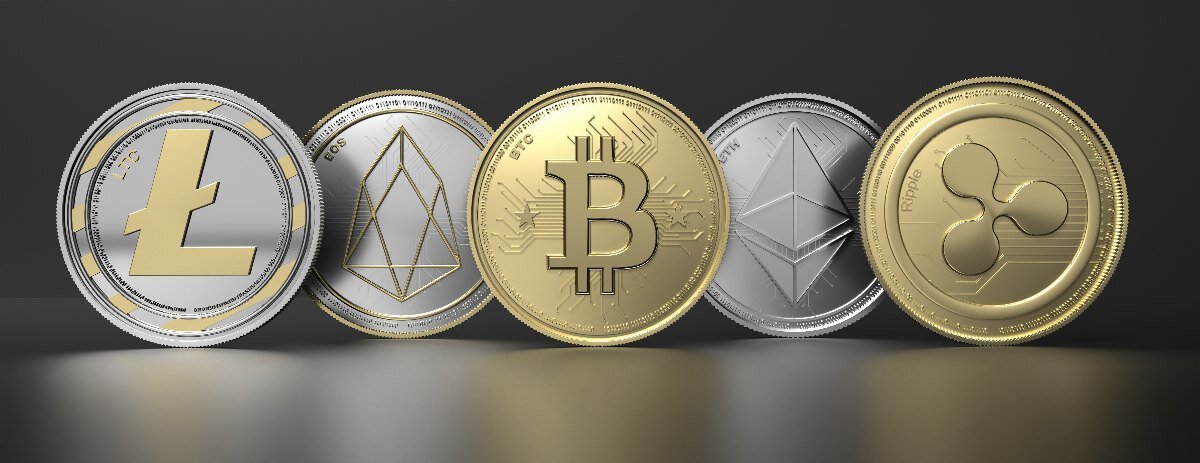Cryptocurrency


To understand the basics of cryptocurrency, we should first remind ourselves of something we rarely think about when it comes to money of any sort.
It’s pretend.
Don’t misunderstand. U.S. currency is not “pretend” in the sense of being counterfeit or designed to deceive anyone. It’s legitimate, but only because we’ve all agreed that it has value. That’s true of all paper money and most specie (coins used as currency). The $20 bill in your wallet has little inherent value. It can’t really be used for much itself. It won’t conduct electricity, heal a cut, or provide nutrition if you eat it. It’s worth $20 for one reason – because we all accept and believe that it’s worth $20 of goods and services.
It’s worth $20 because I can trade it for a nice lunch with enough left over to grab a snack later. It’s worth $20 because I can give it to the guy at the convenience store for enough gas to fill my tank. It’s worth $20 because hundreds of thousands of strangers in the world around me are willing to treat it like it is. This perceived value is helped by the fact that the U.S. Government assures us that this green slip of paper is backed by the “full faith and credit” of Uncle Sam. (This is more comforting if you don’t think about it too closely.)

That’s different than how money worked a century ago. Before 1933, every U.S. dollar printed was backed up by a commensurate amount of gold in a government vault. Debates over the money supply were generally between those promoting the “gold standard” (money backed up exclusively by gold) and those favoring a “bimetallic standard” (money backed up by silver as well as gold, thus dramatically expanding the U.S. money supply while still guaranteeing a “hard value” to every paper bill or metal coin).
Today, the value of U.S. currency is based on a wide variety of factors, many of which come down to “what can you get for it?”
At the same time, the Federal Reserve and other government entities have learned over time how to nudge that value up and down by raising or lowering the rates at which banks borrow from one another or choosing to buy or sell treasury bonds back and forth with approved financial institutions and… well, it all gets very complicated. The point is, while the value of U.S. currency is in many ways a fiction on which we’ve all agreed, it’s one which the federal government (or potentially other major players) have the ability to tinker with as they see fit. That doesn’t mean the value of money will always do what they hope, but it can be “nudged” somewhat.
And here’s one more wrinkle – more and more, money isn’t passed around in paper form at all. Many of us are paid via direct deposit, make most of our purchases with credit cards or electronic debits, and otherwise transact the vast majority of our monthly business without ever touching the money we’re making or spending. In other words, we’re agreeing to pretend to make and spend money that we’ve previously agreed to pretend has a specific value. Suddenly, the entire system seems a tiny bit less ironclad, doesn’t it?
If the largest economies in the world can operate successfully using paper money to represent various amounts of value, or electronic representations of that paper and the value it represents, maybe it’s not so crazy that a group of individuals unconnected to any government could do the same basic thing. Cryptocurrency is all electronic – there’s no paper money or physical coins associated with it. It depends entirely on the collective faith of those using it for value.
While that might at first seem like a disadvantage, stop and consider how many people don’t particularly trust or rely on their governments (whether in the U.S. or in other parts of the world) to always make the best choices. Then think about the enhanced role that “crowdsourcing” has come to play in 21st century society. More and more people are finding value in “the collective.” Virtual currencies aren’t run by a government body, but by the users themselves. No one’s required to participate, and everyone’s input has equal value, with the majority naturally choosing the direction their cryptocurrency goes. The “crypto” part is new, but most societies throughout history have developed some form of currency or another as they developed, with or without government assistance.

Once we step back and consider how intangible and uncertain traditional currency can be even in the best of times… add in a little historical perspective about how currencies have developed in different cultures over the centuries… and cap it all off with the potential of modern technology to coordinate vast amounts of very detailed data relatively securely… it’s not really such a leap to think that a small group of individuals could substitute their own “virtual currency” for the paper and coin type. They determine the value, as well as its success or failure, simply by using it or not using it.
Because it’s relatively anonymous (not entirely, but close) and very easy to send or receive around the world with much lower fees than traditional currencies, bitcoin and other cybercurrencies are very popular with some international traders. Critics say this also makes it easier to finance illegal activity since vast amounts can be sent almost anywhere and are very difficult to trace back to the individuals involved.
As with anything else, bitcoin value rises as demand increases and falls when interest drops. There’s a finite amount of bitcoin in the world, and while more is being created, it will be capped at a predetermined number of units in another few years. If interest remains high, this should lead to an increase in bitcoin value across the board. Then again, it could all crash in an instant and be worth nothing overnight.
That’s part of what makes it interesting.
We’d like to take a moment and distinguish between two ways to “understand” cryptocurrency going forward. One is the technical side of it – the actual computer technology and expertise involved in creating virtual currencies, the math behind the security protocols, and other very specific computer science know-how. While it’s useful to have a general idea about these things and how they work, this isn’t the place for a deep dive into those sorts of scientific logistics. Instead, we’re going to focus on a practical understanding – the most common terminology and issues associated with cryptocurrency, and why some people choose to treat it as an investment opportunity more than a practical method of exchange in their day-to-day lives. (They don’t bitcoin spend; they bitcoin invest.)
Let’s start with some of the terms you’ll want to recognize if you’re considering ways to invest money in cryptocurrency.
Bitcoin was the first cryptocurrency and the name most people first think of when the subject is discussed. While it’s convenient to talk about bitcoin cryptocurrency as if it involves actual little round metal pieces of money, it does not. It is a software program at heart – a set of protocols and processes set in motion by an anonymous developer or team of developers who chose the pseudonym “Satoshi Nakamoto.”
Like Coke or Kleenex, it’s easy to say “bitcoin” when referring to cryptocurrency in general, despite the term being entirely “brand specific.” Bitcoin was the first, but there are hundreds of others around today – some very similar, and some of which do certain things a little differently. It’s impossible to know if any or all of them will last. In a decade, there may be only two or three, or none, or it may turn out that dozens or even hundreds can all co-exist effectively.
When we talk about bitcoin here, the same information usually applies to other varieties of cryptocurrency as well. If you’re considering bitcoin investment or read about the bitcoin stock market, that doesn’t mean it has to involve Bitcoin, the company. Crypto prices may rise and fall together or separately – what happens with Bitcoin may not be the same as happens with other forms.
The easiest way to think of a blockchain is as a large, shared ledger of cybercurrency transactions. A thorough ledger would record all bitcoin exchanges – every purchase or other exchange between two or more parties, including the amounts exchanged, the reason for the exchange, and appropriate identifying and contact information for those involved. Transactions would be recorded in order, from oldest to newest and moving forward from there.
Blockchains are available for all users to view or access but coded in such a way that it’s difficult to identify the specific real life counterparts associated with each transaction. A paper ledger used by a bank would have been verified and secured by bank management at various levels. Credit card or PayPal transactions are verified and secured by the companies profiting by making such transactions possible. Blockchains don’t have a single source of oversight. Instead, volunteers validate each transaction multiple times and receive bitcoin cryptocurrency (or other cybercurrency) for their trouble.
The process itself involves multiple computers running high speed algorithms and a level of randomizing to keep the process theoretically “fair” – equally available to any participating user of bitcoin or other form of cybercurrency in question. As the technology has evolved, a limited number of sophisticated computers are doing the majority of validating and profiting substantially as a result (see “bitcoin mining”). There’s no central authority regulating or validating blockchain transactions, and yet they’re as secure as any other form of exchange in the world (and more secure than some).
The process of validating data and adding “blocks” of verified information to the blockchain is called “bitcoin mining.” The terms comes from the bitcoins awarded to the individuals or entities doing the validation. In theory, anyone can commit their computing power to the task and essentially be thrown into a pool of potential “winners.” In reality, very powerful computers designed specifically for the task do the majority of the “mining” and are awarded the majority of new bitcoin.
The “mining” analogy is also appropriate because the awarded bitcoin isn’t taken from somewhere else and given to the “winners.” It’s created for the task, adding to the total amount of bitcoin available in the world – like rare minerals being dug out of literal mines.
Like the image of coins or ledgers, the image of a wallet is helpful for understanding the purpose of a bitcoin wallet. It is not, however, a wallet at all in the traditional sense.
A bitcoin wallet is in many ways like a key allowing you to do secure bitcoin trading from your phone or computer. It might be helpful to envision it as a physical wallet with a single card inside that you’re required to insert any time you want to complete a transaction. It can be stored on your desktop computer, mobile phone, online on the web, or on a removable piece of hardware like a flash drive.
Because each user’s needs are different, it’s important you consider your likely needs and personal style before searching for the best bitcoin wallets. A better way to think of it might be to search for the best bitcoin wallets for you.
Now we’re getting to the part relevant to many investors who could care less about hexadecimal algorithms or blockchain hashing. Bitcoin exchanges are online marketplaces where you can convert traditional currency into bitcoin cryptocurrency or other cryptocurrency, convert cryptocurrency into traditional currency, or exchange one form of cryptocurrency into another. Think of them like those currency exchange kiosks at the airport or in some large cities with visitors from around the world. There are a number of options out there, each with its own advantages and disadvantages. It can be a bit dauting to the newcomer, so it’s worth taking the time to educate yourself and hear what others more experienced in bitcoin trading have said about the options before diving in.
You don’t technically have to go through an exchange to trade bitcoin. You can arrange transactions directly with other users if you prefer – that’s the beauty of cybercurrency. Most users, however, find using bitcoin exchanges far more secure and convenient. If your goal is to buy some bitcoin to spend on something from a seller who prefers cybercurrency, this is where you go. If you own some form of cybercurrency you’d like to convert into traditional dollars, bitcoin exchanges can help you with that as well.
Of course, the values of different currencies tend to rise and fall with economic conditions and world events and such. In the same way the value of a dollar can fluctuate from week to week, bitcoin value can change dramatically over time. It’s because of this that some investors treat bitcoin exchanges as a sort of rogue bitcoin stock market – buying, trading, and selling solely as a way to make profits rather than out of any interest in the technology or its potential.

Investing in cryptocurrency is in some ways like any other gamble. You buy a certain amount hoping the value will rise, and sell when you think it’s reached the likely peak. All investment is a risk, but cryptocurrency prices are particularly unpredictable because of the unique “product” being traded.
It’s entirely possible a minimal cryptocurrency investment now could result in massive profits in subsequent years as bitcoin or other cryptocurrencies become increasingly popular and take over the financial world. (Early investors in bitcoin have certainly done OK.) It’s equally possible that at some point a majority of them will completely fail and cryptocurrency prices dive even among those which remain. So far, the U.S. government has allowed bitcoin and bitcoin investment to proceed unmolested, but who knows if or when an anxious Congressman or future President might suddenly decide it’s a threat to the American economy and get involved regulating or even banning it? It’s the extremely unpredictable nature of cryptocurrency investment that makes it so enticing for some – like bungee jumping from the space shuttle, it could be a disaster or the adventure of a lifetime.
Some investors have taken the alternate root of blockchain investing. Rather than rolling the dice on crypto prices per se, they’re betting on the technology which makes bitcoin investment possible. Even if bitcoin or other specific brands of cryptocurrency eventually fall, blockchain technology is likely to remain useful and continue evolving, making blockchain investing potentially safer than other ways to invest money in this ever-shifting field.
If you decide that investing in cryptocurrency is something you’d like to try, we can help you evaluate the best bitcoin wallets, talk you through the differences between the major bitcoin exchanges, and discuss other virtual currencies which seem to have investors excited. We’ve never believed in telling you what to do with your money, and there’s no denying that bitcoin cryptocurrency prices have risen more impressively than most of us expected over the past decade and weathered several predictions that bitcoin value had peaked and bitcoin trading would be selling off in a panic any day now. Cryptocurrency investment has proven quite profitable for many people. You want to bitcoin invest? We want to offer information, support, and connections.

That said, we’re also happy to talk you through more traditional ways to invest money. You should never invest more than you can afford to lose, no matter what the stock or precious metal or commodity. All investments are inherently risky, although some are clearly more or less risky than others. Cryptocurrency prices are particularly unpredictable and bitcoin trading should probably not be considered as the primary foundation for your retirement or your kids’ college funds or anything else essential to your long-term security.
If you have extra resources to play with and you’d like to roll the dice on bitcoin value or the so-called “bitcoin stock market,” we’ll help you gather the most reliable information out there in order to support that decision. It would not be our first choice for the novice investor or anyone not able to afford this level of risk. If you do decide to give it a shot, maybe start small.
You know, by investing just a little… bit.